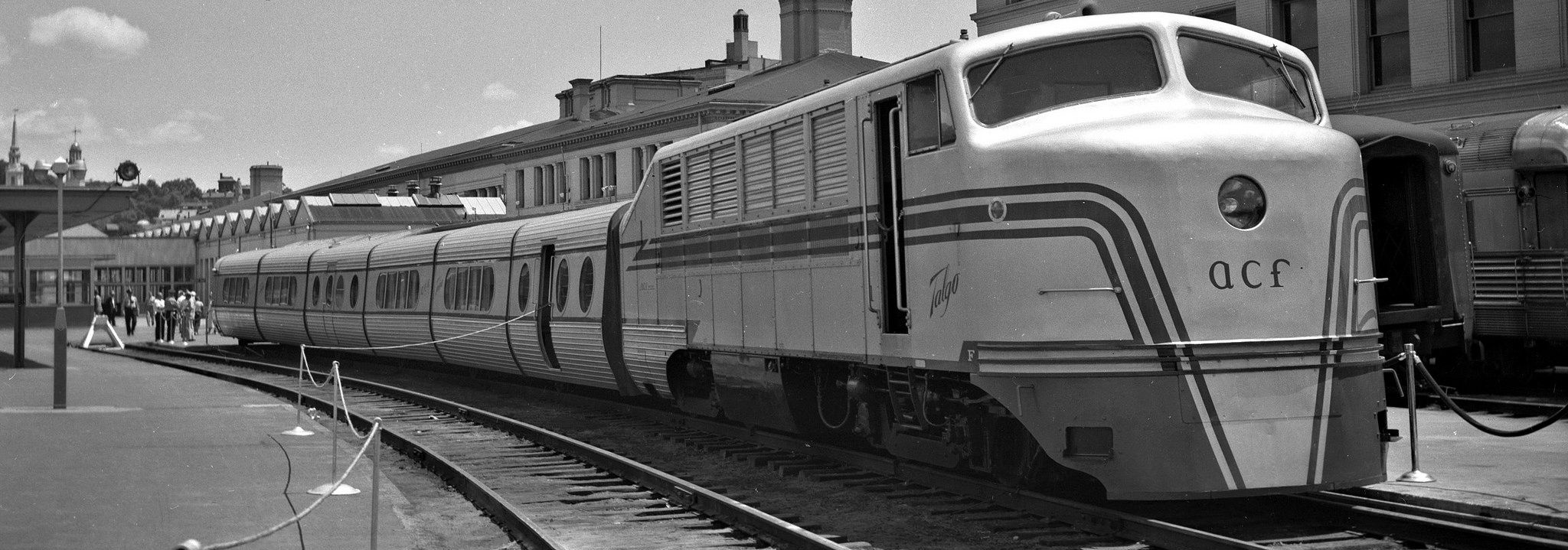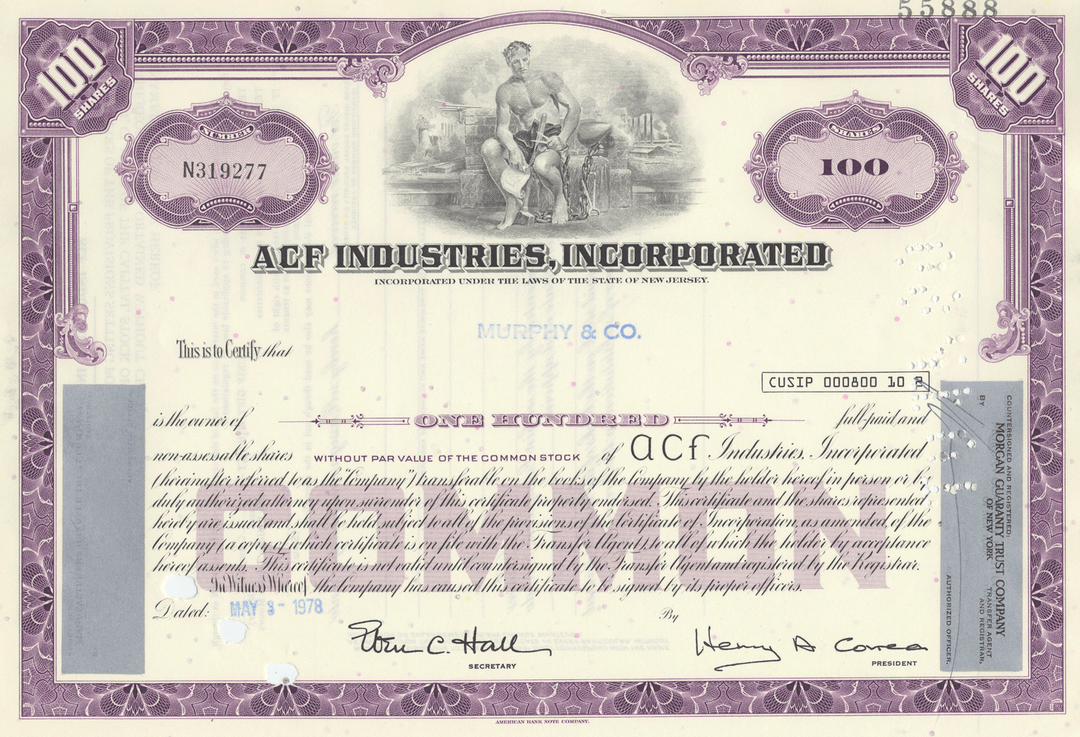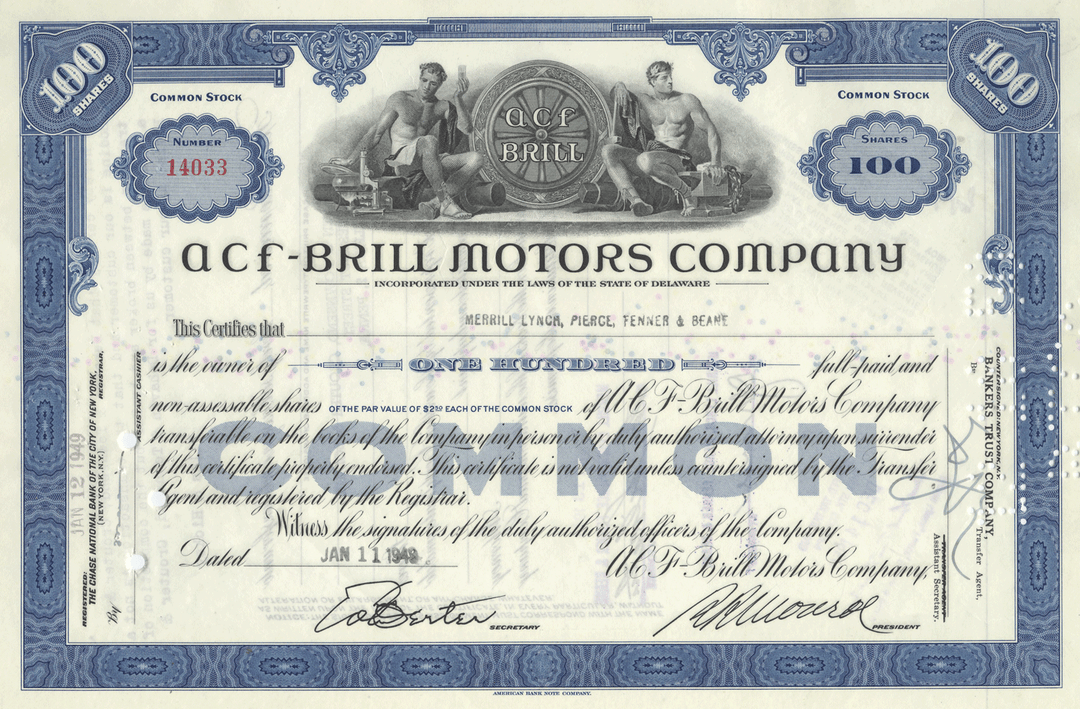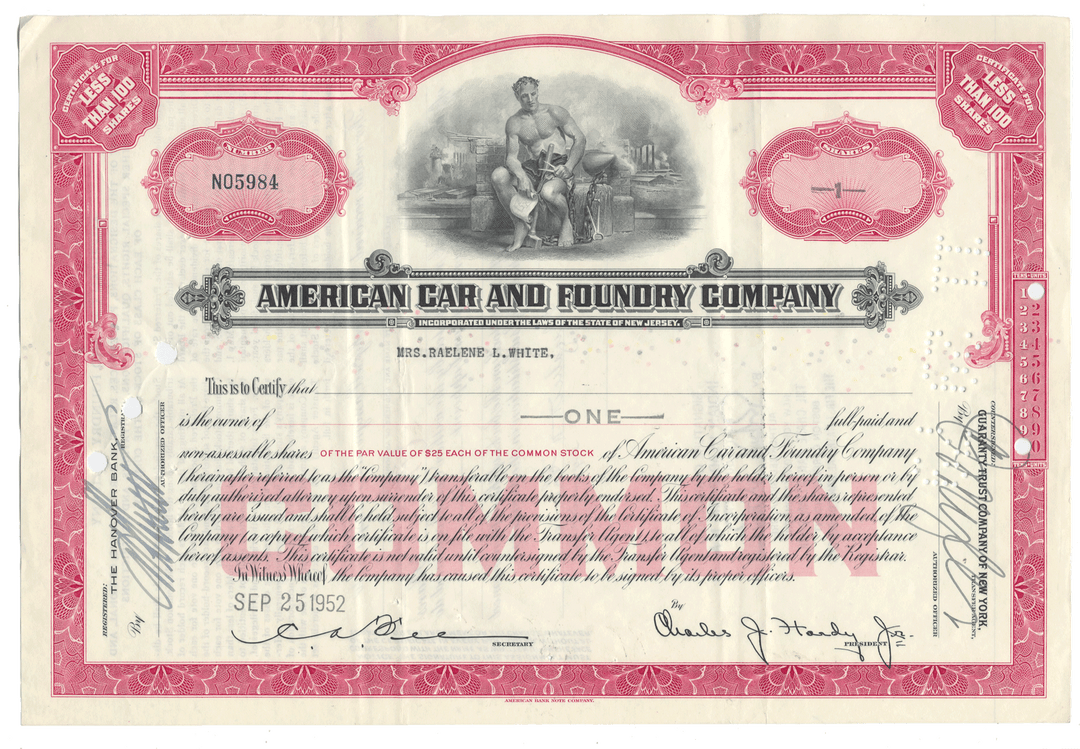
American Car & Foundry traces its history to 1873, the year the St. Charles Car Manufacturing Company was founded. This was one of the thirteen railroad carbuilding companies that merged in 1899 to form the American Car and Foundry Company. The country's first railroad tank car, a "tub car" was built by one of these companies in 1889.
Five years after the 1899 merger, the first all-steel passenger car ever ordered from a car builder left the former Berwick, Pennsylvania shop. It was the first of a shipment of 300 similar cars built for New York City's pioneer subway, the Interborough Rapid Transit Company. By 1906, AC&F had steel shops at St. Louis, Detroit, Berwick, Huntington, and Madison, IL.
American Car and Foundry Company's reputation rapidly spread abroad and in 1905 more than 100 motor and trailer subway cars were shipped to England for use in London's underground system.
In 1917, a tank car leasing operation began which, in 1923, became Shippers Car Line, and later was acquired by AC&F in 1927. During World War I, AC&F produced artillery gun mounts and ammunition, field kitchens, pack saddles, submarine chasers, cloth shrinking machines and rollers, and even wooden tent pegs, as well as railway cars, for the Allies. AC&F's Wilmington plant also produced boats for the navy, and after the war switched production to yachts.
In 1922, AC&F expanded into the automotive field by acquiring Carter Carburetor Corporation of St. Louis. This was our first step in product diversification - planned and executed long before the diversification concept became the by-word of American industry. In 1925, AC&F acquired Fageol Motors Company, a bus builder, and the Hall-Scott Motor Car Company, which produced bus engines. In 1926, AC&F acquired the J. G. Brill Company, a streetcar builder. During World War II, several AC&F plants produced army tanks, aircraft subassemblies, artillery shells, armor plate, and hospital cars, as well as ordinary railroad cars.
The ACF-Brill Motors Company was formed under a June 19, 1944 agreement between American Car & Foundry Motors Company and the Brill Corporation. The company owned no physical properties but was the sole stockholder of its operating companies – the F.G. Brill Company, Philadelphia; the American Care and Foundry Motors Company; the Hall-Scott Motor Car Company, Berkeley, California, and the Fageol Motors Company, manufacturers of trolley coaches, steel metal pressings and engines.
The American Car and Foundry Company and a subsidiary, American Car and Foundry Investment Corporation, owned about 45 per cent of the common stock under the merger agreement, exclusive of 280,138 shares registered for purchase on the exercise of warrants. American Car and Foundry Investment were also issued warrants for 178,072 shares of common stock under the merger agreement. A total of 1,250,000 shares were authorized to be issued.
Although ACF's motor buses were highly regarded by it their users, they never got above fifth place in sales and at War's end, the newly-organized ACF-Brill Motors Company was put up for sale. Ripe with cash from massive wartime contracts, Consolidated Vultee Aircraft Corporation purchased all of American Car & Foundry's bus building divisions from A.C.F. in early 1946.
The sale to Consolidate Vultee ended ACF-Brill's involvement with American Car and Foundry and the motor coach manufacturer now answered to the directors of Consolidated Vultee. All former ACF motor coach assets were transferred to Consolidated-Vultee's 4-year-old Nashville, Tennesee facility and bus production commenced in late 1945.
At the end of the War, General Motors couldn’t keep up with the demand for their highly-regarded diesel transit coaches to the benefit of the nation’s smaller bus manufacturers such as ACF-Brill. Large fleets of gasoline–powered ACF-Brill transit coaches were sold to a handful of East Coast operators who were desperate for product, one example being the Baltimore Transit Company who ordered 162 ACF-Brill gasoline coaches in 1947.
A small number of Willys-badged 15-17 passenger coaches were constructed in the late 1940s using chassis supplied by Willys-Overland, but the underpowered coaches were not successful. For a short period of time ACF-Brill’s trolley coaches proved popular with municipalities seeking to replace worn-out streetcars and a few large orders were placed by surface transit operators in Boston, Chicago, East St. Louis, Houston and other smaller cities. A few orders trickled in for ACF-Brill's line of intercity coaches, which had enjoyed moderate success before the war, but like their main competitor, Flxible, post war sales disappeared once it became known that new Diesel-equipped GM Silversides were available.
Once their diesel transit coach operations got up to speed, it was nearly impossible to compete with General Motors and by 1952 orders for new ACF-Brill transit coaches dried up completely. ACF-Brill tried to break into the school bus market with a line of Brill-badged purpose-built school buses, but sales were disappointing at best. Flxible managed to stay in business into the late 1950s but Consolidated-Vultee's directors shut down all bus production in 1954. The firm's Nashville plant remained in operation producing television cabinets and airplance components into 1959 when it was taken over by AVCO.
By 1954, the corporation's interests had become so diversified that the name was changed from American Car and Foundry to ACF Industries, Incorporated. ACF produced its last passenger car in 1959.
ACF's history has been chronicled in a book by employee Ed Kaminski, titled "American Car & Foundry" published by Signature Press.









